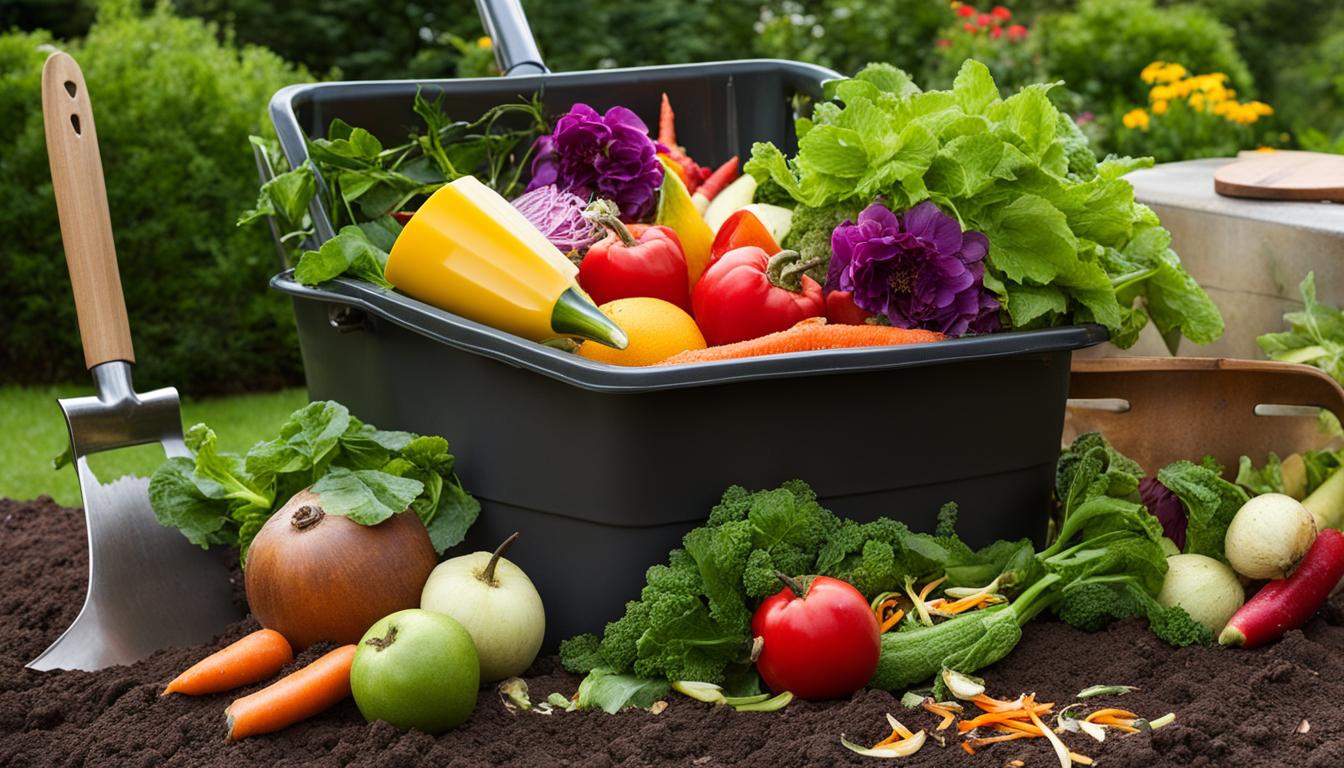Hola! I’m so excited to share with you all about the wonderful world of composting. If you’ve ever wondered how to turn your kitchen scraps into valuable “garden gold” and reap the benefits of organic gardening, you’re in the right place! In this comprehensive composting guide, I’ll provide you with the essential composting tips and methods, making it easy for even beginners to get started.
Composting is a fantastic way to recycle kitchen waste and contribute to sustainable gardening practices. By transforming food scraps, yard trimmings, and other organic materials into nutrient-rich compost, you not only reduce waste and greenhouse gas emissions but also improve the health and fertility of your garden soil.
Throughout this article, I’ll walk you through the step-by-step process of composting, from choosing the right compost bin to understanding the four key ingredients for successful decomposition. We’ll also explore what you should and should not compost, as well as when your compost is ready to use.
But before we dig deeper into the world of composting, let’s take a moment to explore why composting is so beneficial for your plants and the environment.
Key Takeaways:
- Composting is a sustainable way to recycle kitchen waste and reduce waste sent to landfills.
- Compost is a valuable soil amendment that improves soil structure, moisture retention, and plant nutrient availability.
- Composting promotes long-term plant health by providing slow-release nutrients and reducing the need for synthetic fertilizers and pesticides.
- By using compost, you can mitigate climate change by sequestering carbon and reducing greenhouse gas emissions.
- Composting is a simple and rewarding practice that anyone can do, whether you choose to compost at home or utilize compost pickup services.
What Is Compost?
Compost is a natural and nutrient-rich soil amendment that is created through the decomposition of organic material.
When organic waste, such as kitchen scraps and yard trimmings, undergoes composting, it breaks down into a dark, crumbly substance known as humus. This humus is packed with essential nutrients like nitrogen, phosphorus, and potassium, making it an excellent soil amendment for enhancing plant growth and health.
Composting is a controlled process that replicates the decomposition found in nature. Microorganisms, such as bacteria and fungi, play a crucial role in breaking down the organic material. They consume the organic matter and convert it into simpler compounds that can be easily absorbed by plants.
By incorporating compost into the soil, it improves its structure, allowing for better drainage and root penetration. It also increases the soil’s moisture-retaining capacity, reducing the need for frequent watering. Furthermore, compost enriches the soil with beneficial microorganisms, aiding in natural nutrient cycling and contributing to overall soil health.
“Compost is nature’s way of recycling organic waste, transforming it into a valuable resource for sustainable gardening.”
Using compost as a soil amendment offers numerous benefits, including:
- Improved soil fertility and nutrient availability: Compost releases nutrients slowly over time and provides a balanced supply of essential elements for plant growth.
- Enhanced plant health and disease resistance: The presence of beneficial microorganisms in compost can suppress harmful pathogens and improve plant resilience.
- Reduced reliance on synthetic fertilizers: Compost reduces the need for chemical fertilizers, minimizing the environmental impact of conventional agriculture.
- Increased sustainability and waste reduction: Composting diverts organic waste from landfills, reducing greenhouse gas emissions and closing the loop on organic material’s lifecycle.
Compost is an invaluable resource for both home gardeners and commercial growers looking to improve soil quality, conserve resources, and promote sustainable practices.
| Benefits of Compost | Why Use Compost? |
|---|---|
| Enhances soil fertility | Improves plant growth and health |
| Enriches soil structure | Increase moisture retention |
| Suppresses plant diseases | Reduces reliance on synthetic fertilizers |
| Reduces waste sent to landfills | Promotes sustainability |
Why Composting Is Good for Plants
Composting offers a multitude of benefits for plants, contributing to their overall health, sustainability, and long-term growth. Let’s explore the key reasons why composting is essential for plant vitality.
Improves Soil Structure
Compost plays a crucial role in enhancing soil structure. The organic matter in compost helps bind soil particles together, creating aggregates that improve soil porosity and drainage. This creates an ideal environment for roots to penetrate, access oxygen, and absorb vital nutrients.
Provides Nutrient-Rich Soil
One of the greatest advantages of composting is its ability to enrich the soil with essential nutrients. Compost contains a balanced combination of macronutrients, including nitrogen (N), phosphorus (P), and potassium (K), as well as micronutrients, trace minerals, and beneficial microorganisms. These nutrients are released slowly over time, ensuring a steady and sustained supply to plants as they grow.
Promotes Plant Health
The nutrient-rich composition of compost directly contributes to improved plant health and vigor. Unlike synthetic fertilizers that provide an immediate nutrient boost, compost nourishes plants gradually and encourages natural growth processes. This leads to stronger root systems, enhanced disease resistance, and increased overall plant resilience.
Reduces Dependency on Synthetic Fertilizers and Pesticides
By incorporating compost into your gardening practices, you can reduce your reliance on synthetic fertilizers and pesticides. Compost naturally replenishes and fortifies the soil, reducing the need for chemical interventions. This promotes a more sustainable approach to gardening and contributes to a healthier environment.
Enhances Sustainability
Composting is a sustainable practice that aligns with the principles of conservation and waste reduction. By diverting organic waste from landfills and converting it into nutrient-rich compost, you help decrease landfill volumes and reduce greenhouse gas emissions. Additionally, composting recycles valuable resources, embracing a circular economy and supporting a more sustainable future.
Composting not only benefits plants but also contributes to a healthier environment and a more sustainable way of life. By harnessing the power of compost, we can cultivate thriving gardens while reducing waste and promoting ecological balance.
| Benefit | Description |
|---|---|
| Improves Soil Structure | Enhances soil porosity and drainage, allowing roots to access oxygen and nutrients. |
| Provides Nutrient-Rich Soil | Supplies a balanced combination of macronutrients, micronutrients, and beneficial microorganisms. |
| Promotes Plant Health | Strengthens root systems, enhances disease resistance, and increases overall plant vitality. |
| Reduces Dependency on Synthetics | Lessens the need for synthetic fertilizers and pesticides, fostering a more sustainable approach. |
| Enhances Sustainability | Diverts organic waste from landfills, reduces greenhouse gas emissions, and supports circular resource management. |
Through composting, we can harness the countless benefits it offers and cultivate thriving gardens that not only beautify our surroundings but also contribute to a healthier planet.
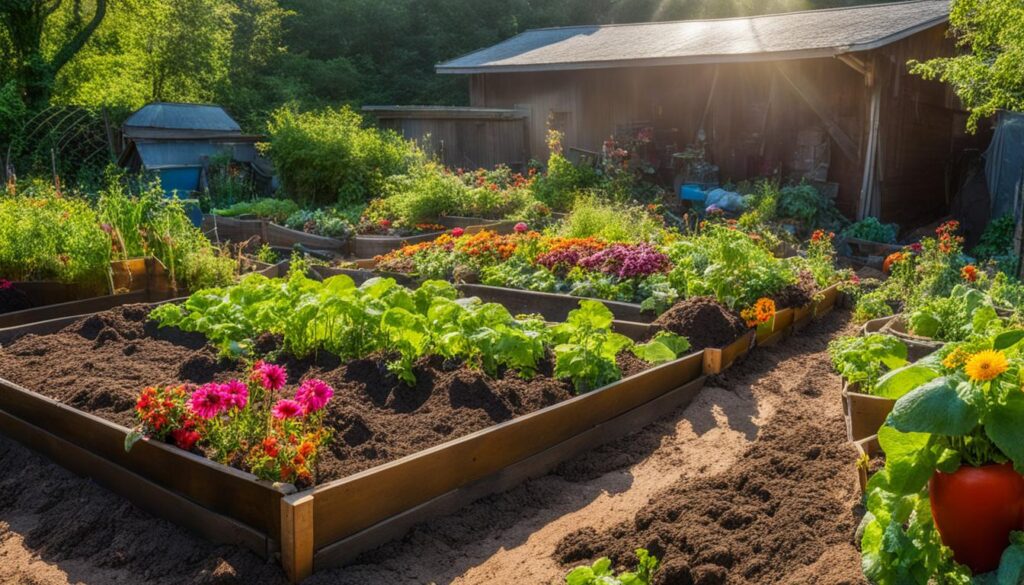
How to Choose a Compost Bin
When it comes to composting, one of the most important decisions you’ll make is choosing the right compost bin. Your choice will depend on factors such as your lifestyle, available space, and composting goals. Let’s explore some options that can suit your needs and help you turn kitchen waste into garden gold.
Tumblers
Tumblers are a popular choice for those seeking convenience and faster composting. These bins are designed to be rotated, which aids in the decomposition process by mixing the compost materials thoroughly. Tumblers also help control odors and deter pests. They are particularly well-suited for small spaces and urban gardens.
Stationary Bins
If you have ample yard space and prefer a more budget-friendly option, stationary bins are worth considering. These bins are static and allow compost materials to break down over time. They often feature open bottoms that allow for improved aeration and drainage. Stationary bins are ideal for larger gardens, as they can accommodate a greater volume of organic waste.
Worm Composting Systems
For those looking to take their composting to the next level, worm composting systems, also known as vermicomposting, are a fantastic choice. These systems utilize red wigglers or manure worms to break down organic matter more efficiently. Worms consume the kitchen scraps, producing nutrient-rich worm castings that are excellent for your garden. Worm composting systems are compact and can be used indoors or outdoors.
DIY Approach
If you’re on a budget, a DIY compost bin is an excellent option. You can repurpose a plastic bin by drilling holes for aeration and drainage. This budget-friendly approach allows you to customize the size according to your needs and available space. Remember to choose a convenient location for your DIY compost bin and layer the compost materials correctly to ensure proper decomposition. Regular turning and maintenance will be essential for successful composting.
Choosing the right compost bin is crucial for effective waste management and successful composting. Consider your lifestyle, space availability, and composting goals when making your decision. Whether you opt for a tumbler, stationary bin, worm composting system, or a cost-effective DIY approach, with the right bin, you’ll be well on your way to creating nutrient-rich compost for your garden.
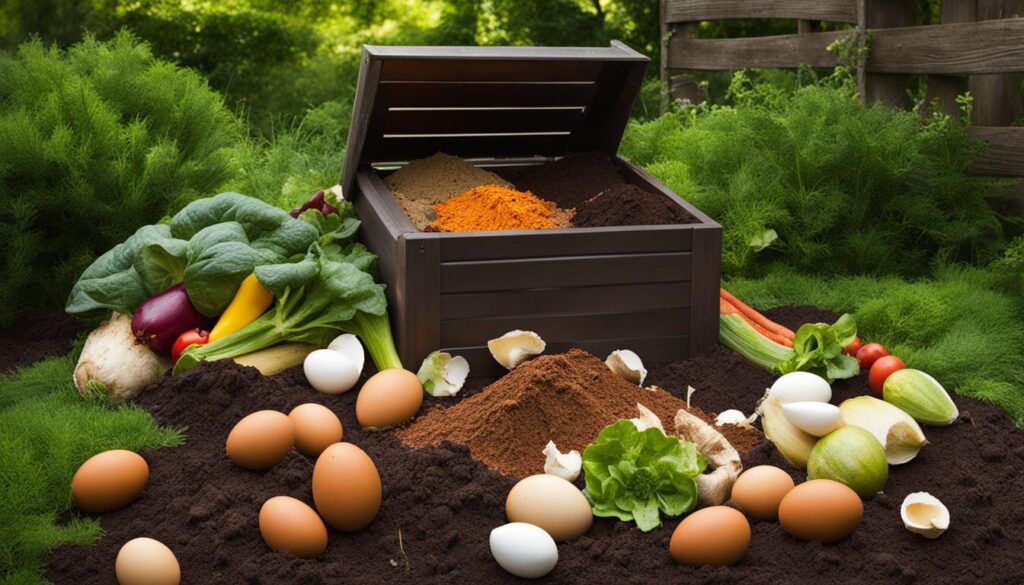
What Are the Four Ingredients for Compost?
Composting requires four key ingredients – carbon-rich materials (browns), nitrogen-rich materials (greens), air, and water. These essential components work together to create a fertile environment for decomposition and nutrient-rich compost.
To achieve a successful compost pile, it’s important to understand the roles of each ingredient:
Browns: Carbon-Rich Materials
Browns refer to carbon-rich materials that provide the energy source for decomposers and help maintain a balanced carbon-to-nitrogen ratio in the compost. These materials include dried leaves, twigs, shredded paper, and straw. They break down slowly and provide structure to the compost pile.
Greens: Nitrogen-Rich Materials
Greens are nitrogen-rich materials that supply the necessary nutrients for microorganisms and accelerate the composting process. Fruit and vegetable scraps, coffee grounds, grass clippings, and fresh plant trimmings are good examples of greens. These materials decompose quickly and provide the necessary nitrogen for microbial activity.
Air: Oxygen for Decomposition
Adequate air circulation is crucial for composting. Oxygen supports the aerobic decomposition process, allowing microorganisms to break down organic matter efficiently. Turning the compost pile regularly helps introduce oxygen and prevents a compacted, odor-causing anaerobic environment. It’s like giving your compost a breath of fresh air.
Water: Moisture for Decomposition
Moisture is essential for microbial activity and decomposition. A properly moistened compost pile should resemble a damp sponge, providing an ideal environment for microorganisms to thrive. Aim for a moisture content of around 40-60%, similar to that of a wrung-out sponge. If the pile becomes too dry, decomposition slows down, while excessive moisture can lead to unpleasant odors and anaerobic conditions.
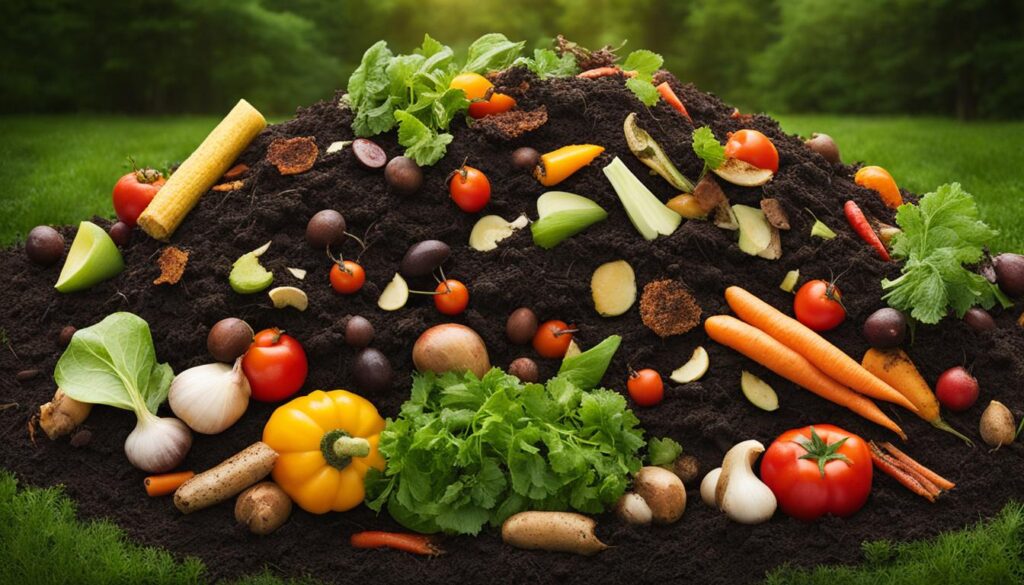
The following table summarizes the key composting ingredients:
| Composting Ingredient | Example |
|---|---|
| Browns (Carbon-Rich Materials) | Dried leaves, twigs, shredded paper, straw |
| Greens (Nitrogen-Rich Materials) | Fruit and vegetable scraps, coffee grounds, grass clippings, fresh plant trimmings |
| Air | Adequate air circulation through regular turning |
| Water | Moisture content similar to a wrung-out sponge |
By combining the right balance of carbon-rich browns, nitrogen-rich greens, air, and water, you’ll create the perfect recipe for successful composting. Remember to maintain the proper ratios, regularly turn the pile, and keep it adequately moist to facilitate the decomposition process and transform your organic waste into nutrient-rich compost for your garden.
List of Things You Should and Should Not Compost
When it comes to composting, it’s essential to know what can and cannot be added to create a healthy and productive compost pile. By understanding what to compost and what to avoid, you can ensure that your composting efforts are effective and environmentally friendly.
What to Compost
Composting is a process that thrives on a diverse range of organic materials. Here are some of the items that you can include in your compost pile:
- Fruit and vegetable scraps
- Coffee grounds and filters
- Eggshells
- Grass clippings
- Leaves
- Shredded newspaper
- Houseplants and flowers
- Straw and hay
- Wood chips and sawdust
- Tea leaves and bags
- Cotton and wool scraps
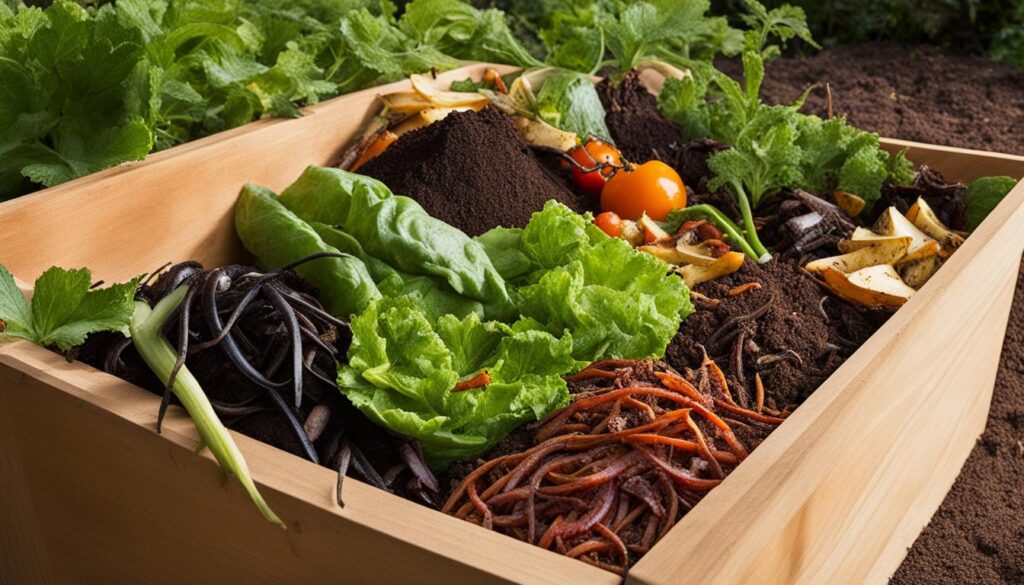
What Not to Compost
While many organic materials can be composted, there are certain items that should be kept out of your compost pile. These items can disrupt the composting process or introduce unwanted pests. Here are some things to avoid composting:
- Meat and fish
- Dairy products like milk, cheese, and yogurt
- Oils and fats
- Animal waste, including pet feces and litter
- Coal ashes
- Charcoal briquettes
- Non-biodegradable materials like plastic and glass
- Plants treated with pesticides or herbicides
- Weeds with mature seeds
- Diseased plants
By keeping these guidelines in mind, you can ensure that your compost pile remains healthy and productive. Remember, composting is a natural process that requires the right combination of organic materials to create nutrient-rich compost for your garden.
When is Your Compost Ready to Use?
Compost is a valuable resource that adds fertility to your garden. But when is it ready to use? Let’s explore the composting timeline and the decomposition process to find out.
The Composting Timeline
The composting process typically takes about 2 to 3 months, but it can vary depending on the conditions and materials you use. During the initial phase, microbial activity and heat generation break down the organic matter. This phase can last for several weeks. Afterward, the compost enters a maturation phase where it stabilizes and matures into a nutrient-rich soil amendment.
Signs of Readiness
So how do you know if your compost is ready to use? The key indicators are its appearance and texture. Ready-to-use compost should be dark and crumbly, resembling fertile soil. It should have a pleasant earthy smell and be free from any unpleasant odors.
Another test you can perform is the germination test. Take a handful of compost and plant some seeds in it. If the seeds sprout and grow well, it’s a good sign that your compost is mature and ready for use.
Why Wait for Completion?
Completing the composting process is crucial before using it in your garden. This is because partially decomposed compost can leach nutrients as it continues to break down, leading to nitrogen competition with your plants. Additionally, harmful microbes may still be present in unfinished compost, which can affect plant health.
By allowing your compost to fully mature, you ensure that it provides optimal nutrition for your plants and avoids any negative impacts on their growth. Patience is key when it comes to composting!
| Signs of Ready-to-Use Compost | Significance |
|---|---|
| Dark and crumbly | Indicates decomposition is complete. |
| Pleasant earthy smell | Showcases the absence of unpleasant odors. |
| Successful germination test | Confirms the maturity and suitability of compost for plants. |
Now that you know how to determine if your compost is ready to use, you can confidently enrich your garden with this organic gold. Remember, proper composting leads to a more sustainable and fruitful gardening experience!
Compost Away!
Starting composting at home may seem daunting, but with proper guidance, anyone can do it. Attending composting workshops or seeking information from experts can help you get started. Learning from experienced composters and gaining valuable insights from their workshops can give you the confidence to embark on your composting journey.
Picking the right compost bin is crucial for successful composting. Whether you prefer a DIY approach or purchasing a ready-made bin, the choice should align with your composting needs. Consider factors such as the available space, convenience, and materials you plan to compost. A well-chosen compost bin will ensure optimal conditions for decomposition and help you achieve beautiful, nutrient-rich compost.
For those who prefer not to compost themselves, compost pickup services offer a convenient alternative. Services like Compost for Life or Soilmate provide hassle-free compost collection, taking organic waste off your hands and diverting it from landfills. This way, you can still contribute to sustainable practices even if you don’t have the means or desire to compost at home.
“Starting composting at home can be a rewarding and sustainable practice. With the right guidance and choices, anyone can turn their kitchen scraps into nutrient-rich compost for their gardens.”
If you’re ready to take the plunge into composting or want to learn more, consider attending composting workshops or reaching out to local experts for guidance. These resources can provide valuable tips, techniques, and troubleshooting advice to help you succeed in your composting endeavors.
| Composting Workshops | Compost Pickup Services |
|---|---|
| Ongoing workshops hosted by gardening experts | Convenient collection of organic waste |
| In-person and virtual options available | Reduces personal waste and carbon footprint |
| Hands-on learning and step-by-step instructions | Dedicated trucks and professionals for waste management |
| Opportunity to ask questions and get personalized advice | Provides a greener alternative for those without the means or desire to compost |
Take the first step towards sustainable gardening and start composting today. Whether you attend workshops, choose the right compost bin, or opt for compost pickup services, your efforts will contribute to a greener and more environmentally friendly lifestyle.
Worms or Not?
When it comes to composting, worms can play a vital role in creating nutrient-rich soil. Vermicomposting, also known as worm composting, is a technique that harnesses the power of these amazing creatures to break down organic waste into valuable worm castings. (Keywords: Vermicomposting, worm composting)
Two popular types of worms used in vermicomposting are red wigglers and manure worms. These worms thrive in a dark and moist environment, making them well-suited for the composting process. They require proper bedding materials like soil, woodchips, and newspaper strips to create a cozy home. (Keywords: red wigglers, manure worms)
Adding kitchen scraps such as fruit and vegetable leftovers, eggshells, tea bags, and coffee grounds into the worm bin provides a steady supply of food for the worms. As they consume the organic matter, they transform it into nutrient-dense worm castings, which can be used as a natural fertilizer for your garden. (Keywords: benefits of worms in compost)
Vermicomposting offers several advantages over traditional composting methods. The worms’ activity aerates the compost, allowing for better moisture retention and reducing the chances of unpleasant odors. Additionally, the produced worm castings are teeming with beneficial microorganisms that improve soil structure and fertility. (Keywords: benefits of worms in compost)
So, if you’re looking to supercharge your composting efforts and produce high-quality fertilizer for your plants, consider introducing some red wigglers or manure worms into your composting system. With their help, you can create nutrient-rich compost and enjoy the bountiful benefits of vermicomposting. (Keywords: Vermicomposting, worm composting, benefits of worms in compost)
Key Takeaways:
- Vermicomposting utilizes worms to break down organic waste into nutrient-rich castings.
- Red wigglers and manure worms are commonly used for vermicomposting.
- Fruit and vegetable scraps, eggshells, tea bags, and coffee grounds can be added to the worm bin as food.
- Worms improve compost aeration, moisture retention, and soil fertility.
Don’t Want to Do It Yourself?
If you prefer not to compost yourself, there are convenient options available. Compost pickup services like Compost for Life and Soilmate offer a hassle-free way to contribute to waste diversion and reduce your environmental footprint. These services collect organic waste from your doorstep and ensure it is properly composted, diverting it from landfills and reducing waste and greenhouse gas emissions.
In addition to compost pickup services, many local programs and organizations in Miami-Dade County support composting and waste diversion efforts. For example, the Miami Beach Botanical Garden provides drop-off locations where you can bring your compostable materials.
By utilizing compost pickup services and taking advantage of local programs, you can make a positive impact on the environment while avoiding the hands-on work of composting yourself.
Want to Learn More?
If you want to learn more about composting, there are various opportunities available to expand your knowledge and skills. Whether you prefer hands-on workshops, in-person classes, or online resources, there’s something for everyone.
Composting Workshops
Join me and fellow gardeners from the University of Florida for interactive composting workshops. These virtual sessions are hosted through the Miami-Dade Public Library and provide step-by-step instructions on how to compost effectively. Learn the ins and outs of composting from the comfort of your own home and get your questions answered by experts in the field.
In-Person Classes
If you prefer a more hands-on approach, organizations like Vizcaya Museum and Gardens offer in-person classes on composting basics. Join like-minded individuals and delve deeper into the world of composting as you gain practical experience and learn valuable tips from experienced instructors. Explore the beauty of gardens while expanding your gardening skills and sustainable practices.
Online Resources
For comprehensive information on at-home composting, look no further than online resources. The Environmental Protection Agency (EPA) website provides a wealth of knowledge on composting techniques, troubleshooting, and best practices. Discover the science behind composting, learn about different composting methods, and find answers to your composting-related questions with just a few clicks.
Composting workshops, online resources, and educational opportunities offer valuable insights and learning experiences for individuals interested in adopting sustainable practices and making a positive impact on the environment.
Conclusion
Composting is a sustainable gardening practice that offers numerous benefits for both the environment and our gardens. By transforming kitchen scraps into valuable compost, we can enrich the soil and promote healthy plant growth. But composting goes beyond that, as it reduces waste, cuts methane emissions from landfills, improves soil health and water retention, and even helps reduce personal food waste. It’s a win-win solution for both nature and us!
Whether you choose to take a DIY approach to composting or utilize compost pickup services, you can contribute to a greener future. DIY composting allows you to have full control over the process, ensuring your kitchen scraps are converted into nutrient-rich compost. On the other hand, compost pickup services provide a convenient option for those who may not have the time or resources for at-home composting. These services collect organic waste, diverting it from landfills and turning it into valuable compost.
Embracing composting in our gardens promotes sustainable gardening practices. It’s a simple yet effective way to reduce our environmental impact and create a more eco-friendly world. Compost improves soil fertility, supports beneficial microorganisms, and reduces the need for harmful pesticides and synthetic fertilizers. By incorporating compost into our gardens, we can foster healthier plants, increase biodiversity, and contribute to the overall well-being of our environment. So let’s get composting and enjoy the many benefits it brings to our gardens!
FAQ
What is compost?
Compost is organic material that has decomposed and recycled into a rich, fertile soil amendment. It is created through a controlled process that mimics natural decomposition. Compost is rich in nutrients like nitrogen, phosphorus, and potassium, and improves soil structure, moisture retention, and microbial activity.
Why is composting good for plants?
Composting is beneficial for plants as it improves soil structure, helps retain moisture, and provides essential nutrients for healthy growth. Unlike synthetic fertilizers, compost releases nutrients slowly over time, promoting long-term plant health. Additionally, composting reduces the need for synthetic fertilizers and pesticides, mitigates climate change by sequestering carbon, and reduces waste sent to landfills.
How do I choose a compost bin?
Choosing the right compost bin depends on your lifestyle, space availability, and composting goals. Options include tumblers, stationary bins, and worm composting systems. A cost-effective DIY option is repurposing a plastic bin. It’s important to drill holes for aeration and drainage, choose a convenient location, and layer compost materials correctly. Regular turning and maintenance are necessary for successful composting.
What are the four ingredients for compost?
Composting requires four key ingredients – carbon-rich materials (browns), nitrogen-rich materials (greens), air, and water. Browns include dried leaves, twigs, and paper, while greens consist of fruit and vegetable scraps, coffee grounds, and grass clippings. The ideal carbon-to-nitrogen ratio is 25 to 30 parts carbon for every 1 part nitrogen.
What can and cannot be composted?
It’s important to know what can and cannot be composted to create a healthy compost pile. Compostable items include fruit and vegetable scraps, coffee grounds, eggshells, grass clippings, leaves, shredded newspaper, and more. Items to avoid composting include meat, dairy products, oils, diseased plants, pet wastes, and non-biodegradable materials.
When is compost ready to use?
Compost is ready to use when it is dark, crumbly, and resembles fertile soil. The composting process typically takes 2-3 months depending on conditions and materials used. The initial phase involves microbial activity and heat generation, followed by a maturation phase. Completing the composting process is crucial before using it in the garden to avoid nitrogen competition and the presence of harmful microbes.
How do I start composting at home?
Starting composting at home may seem daunting, but with proper guidance, anyone can do it. Attending composting workshops or seeking information from experts can help you get started. Choosing the right compost bin, whether DIY or purchased, is important for successful composting. Additionally, compost pickup services like Compost for Life or Soilmate offer convenient alternatives for those who don’t want to compost themselves.
Can worms enhance the composting process?
Worms can enhance composting through vermicomposting, where they break down organic waste into nutrient-rich worm castings. Red wigglers and manure worms are popular choices for vermicomposting. These worms thrive in a dark, moist environment and require bedding materials like soil, woodchips, and newspaper strips. Fruit and vegetable scraps, eggshells, tea bags, and coffee grounds can be added to keep the worms well-fed and the composting process efficient.
Are there compost pickup services available?
If you prefer not to compost yourself, compost pickup services like Compost for Life and Soilmate offer convenient options. These services collect organic waste and divert it from landfills, reducing waste and greenhouse gas emissions. Local programs and organizations, such as the Miami Beach Botanical Garden, also provide drop-off locations for compostable materials.
Where can I learn more about composting?
If you want to learn more about composting, there are various opportunities available. Gardeners from the University of Florida host Zoom workshops through the Miami-Dade Public Library, providing step-by-step instructions on composting. Organizations like Vizcaya Museum and Gardens offer classes on composting basics. Additionally, online resources, such as the EPA website, provide comprehensive information on at-home composting.
What are the benefits of composting?
Composting is a sustainable practice that turns kitchen scraps into valuable compost, enriching soil and promoting healthy plant growth. It reduces waste, cuts methane emissions from landfills, improves soil health and water retention, and reduces personal food waste. Whether through DIY composting or utilizing compost pickup services, anyone can contribute to a greener future and enjoy the benefits of composting in their gardens.

